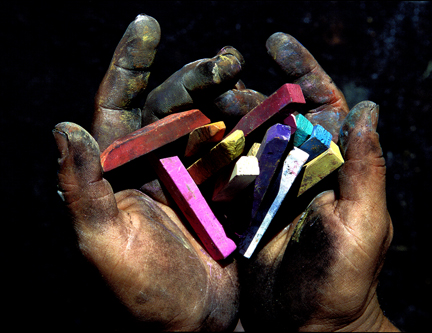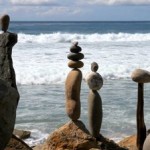I read this author who believed the reason artists make art is because regular language couldn’t capture the meaning of an experience. That the true language of life wasn’t articulated with facts. He didn’t explain it like this, but it’s what he meant I think.
He was referring to Moses and how in the middle of his historical narrative would begin writing poetry. I looked to make sure, and the author was right. Moses often breaks his historical narrative and writes poetry.
I found this quite beautiful and disturbing. I was raised in the church so I’d heard all of the stories of Moses before. I’d also read (parts of) the Bible. But somehow thinking of Moses, an old man with a long grey beard (this is how I always think of Moses) carving words in stone and stopping narrative to write poetry connected me to Moses in a way I hadn’t before experienced.
How often do you really connect to biblical characters? The stories always seemed so fanatical to me that it made it difficult to relate. How can you truly identify with someone who is experiencing something you’ve never experienced?
When I was a little girl the children in grade school often made fun of me. I overheard my teacher and mother talking once. My mother said I was a sensitive soul and that I expressed feelings differently than other children. (Whatever that meant.)
That night my mother asked why I sang so much at school.
I shrugged my shoulders. “No reason.”
But there had to be a reason. Isn’t there always a reason?
The less I sang the more I began to draw pictures. Pictures of women and children, of cities and houses. I also began to write stories about these women and children who lived in these cities and houses. Short stories that I could write on pieces of paper torn from a memo pad. I still have them. They’re before I could spell and my mother thinks they’re adorable. She used to complain about all the boxes in storage. But when we start to sort through them to decide what to throw away and what to keep she becomes nostalgic. She doesn’t want to get rid of anything. I used to resent her for this because it meant that every spring we went out to storage for a weekend to go through boxes. My father and I learned we were just going to be packing up items the way that we found them. I guess mother thinks each year will make it easier to toss these artifacts away. I think each year it gets more difficult.
But I’m glad she kept them. I’m glad I can go back and read my stories; incorrect spelling or not.
Sometimes I find a story that’s better than my current work. If it’s true that artists make art because they’re expressing the language of life, it’d make sense that my work was better as a child than now.
As a child we embrace all our feelings. We cry when we want to cry, we laugh when we want to laugh and we run when we feel like hiding. Self-expression is how we learn. It’s encouraged until a certain age.
After I read the author’s thoughts on Moses’ poetry, I began to think of my childhood stories. Why did I write then and why didn’t I write anymore? I put the book down and sat at my laptop, believing some great epiphany would come to me and I’d finish a few stories. My fingers touched the keyboard and the cursor blinked on the screen, but no words came. Not a single damn word.
That’s when I began to go to museums. If the language of life were in art, maybe I could find it in another artist’s creation.
I went alone because that’s what radicals do. I went to exhibit after exhibit, only stopping for more than a minute to decide if I felt “attracted” to something.
There’s a section of the Perot Museum devoted to hands. It displays the hands of different animals. It compares the chimpanzee, baboon, and human, among others. All these species of monkeys and then the human hand. It struck me the severity of such a project. Scientists and artists must have spent years — no, lifetimes of research to differentiate and document all the differences in these hands.
Hands. What are so important about hands when compared to other biology research?
We say a lot with our hands, don’t we? We clutch them when we’re angry, look at them when we’re ashamed and hide them when we’re shy.
Maybe our hands are like our second voice; our repressed voice. Maybe that’s why some people play instruments, some paint canvases and others write stories.
Because sometimes what’s beautiful isn’t captured with words. It can’t be expressed in a checklist of facts and statistics. It requires song, sketches, and poems.








